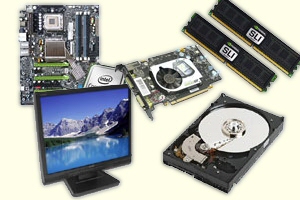
R - What Does That Motherboard Terminology Mean?
RAM (Random Access Memory):
Your computers memory; this is a volatile memory. All programs are stored in this memory when they are running and will be wiped from memory when the computer is powered off.
Redundant Array of Independent/Inexpensive Disks (RAID):
RAID (Redundant Array of Independent/Inexpensive Disks) is a method of using multiple hard drives together for data storage. A RAID system with multiple hard drives appears as a single drive to the operating system. Depending on the RAID level, the benefits provided by RAID is one or more of the following:
better throughput, fault-tolerance or capacity (or something else) when compared to single hard drive.
1. RAID level 0 (or RAID 0) is known as striping, where data is striped across multiple hard drives. RAID 0 provides the most advanced throughput and capacity, but offers no fault-tolerance.
2. RAID level 1 (RAID 1) is known as mirroring, which stores the exact same data within at least two hard drives, this method shows excellent fault-tolerance and reliability, but delivers less capacity efficiency.
3. RAID level 0+1 and RAID 1+0 are both striping and mirroring, providing good fault-tolerance and throughput all at the same time.
4. There are other RAID levels available too, such as RAID level 5 and RAID level 6.
Registered/Unbuffered Memory:
Almost all system memory in today’s PCs is unbuffered memory. With increasing system memory, the stability and performance deterioration of memory is inevitable since the memory controller has to address each memory chip on all modules directly. To solve this problem, higher density systems use registered memory instead which contains registers as buffer to temporarily hold data for one clock cycle before it is transferred. This increases the reliability of high-speed data access to high density memory. Registered memory modules are typically used only in servers and other mission-critical systems where it is extremely important that the data is properly handled.

